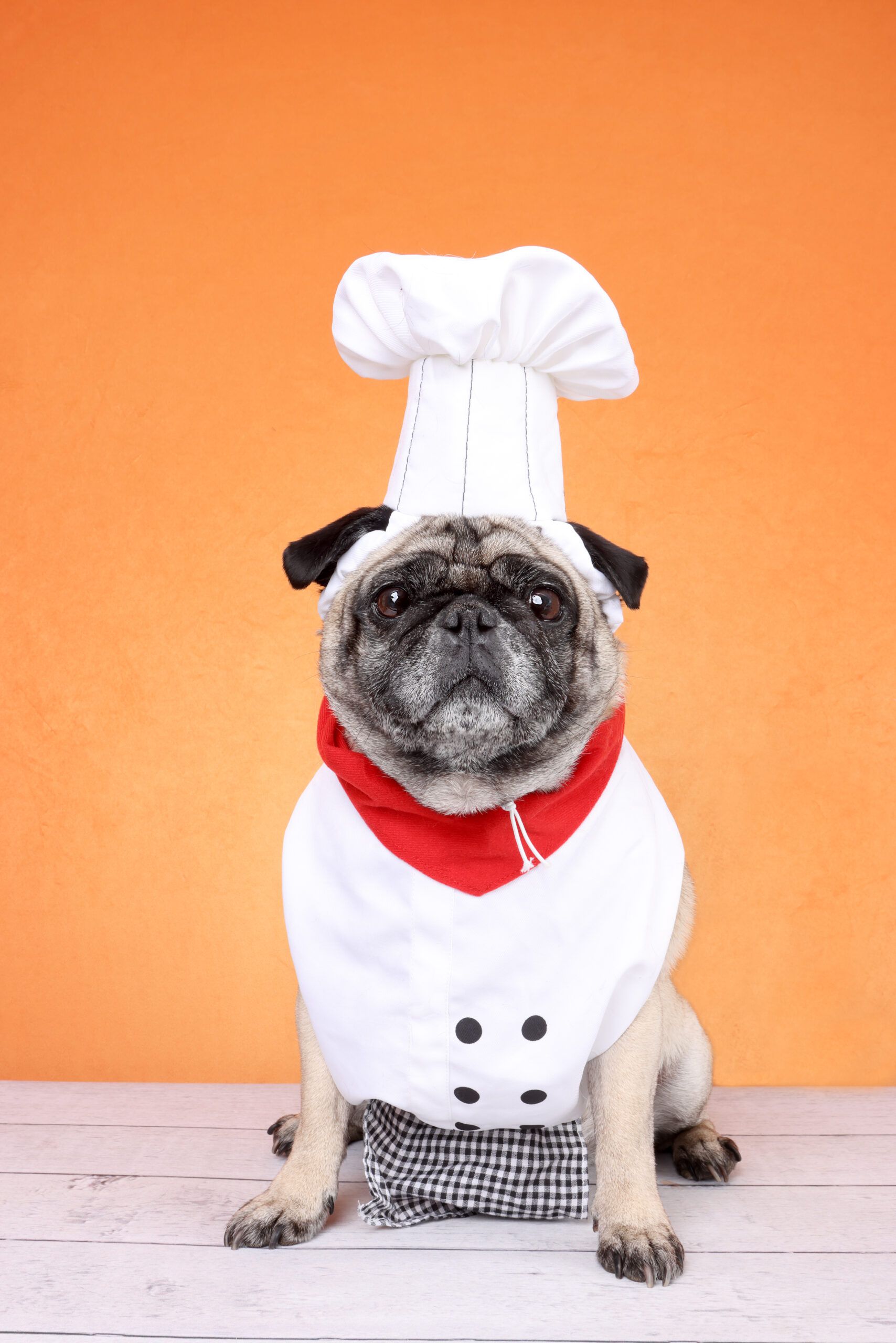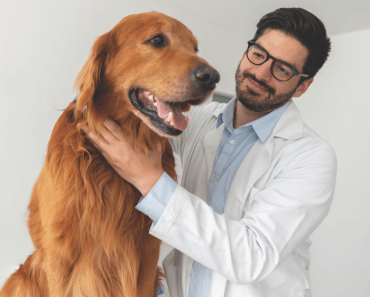
While many pet parents would love to cook homemade dog food, veterinary nutritionists explain why cooking up a recipe of your own could actually harm your hound. They explain why the best food for many dogs is ones you can buy. But in special cases, home-cooked dog food could be just what the doctor ordered. We’ll guide you through all the nutritious and doggy-licious details.
Canine nutrition can be a fuzzy subject. As pet parents, many of us care about our furry friends’ nutritional needs. But the simple fact is that the vast majority of us have a hard enough time with our own human nutritional requirements (be honest!), let alone those of our pets. This is why most veterinary nutritionists suggest you skip homemade dog food for a veterinary nutritionist-approved, all nutrients included, commercially prepared food. Today, there are a variety to choose from, including freshly prepared, veterinary nutritionist-approved, refrigerated dog foods.
Our pet experts gave us the scoop about homemade dog food recipes. Dr. Sean J. Delaney, is a board-certified veterinary nutritionist — a very small area of veterinary specialization that recently became a registered trademark. There are only about 100 board-certified veterinary nutritionists across the United States, and their advice and consultation offer insight into the best diets for our dogs. Linda P. Case is a canine nutritionist and author of nine books, plus the 2022 book Feeding Smart with The Science Dog. She also maintains the website The Science Dog.
How do I make homemade dog food
It’s true that many consumers are concerned about processed foods, whether for humans, canines or felines in their families. First, consult your veterinarian and ask which dog food brands maintain high nutrition, with less processing.
Linda offers a compromise of a solution: Consider feeding your dog a base of mixed kibble as described above, adding home-cooked vegetables on top. Carrots, peas and green beans — or in combination — are more usable by your dog if you cook them and grind them up first, as opposed to serving them raw or whole. Dr. Delaney adds spinach to the list of dog-friendly veggies, plus several fruits, such as apples and blueberries.
Some of the foods that are harmful to dogs and should never be included in homemade dog food include the following (consult your veterinarian for a full list):
- Onions
- Garlic
- Leeks
- Fennel
- Anything in the orange and green squash family
- Grapes and raisins
Homemade dog food recipes: proceed with caution
While it can be fun and meaningful for pet parents to prepare homemade dog food, Dr. Delaney cautions: Even when we have the best of intentions as pet parents, if we seek guidance from sources other than veterinarians or board-certified veterinary nutritionists, we could actually cause our dogs more harm than good. That’s because the concentration of minerals and vitamins in home-based concoctions isn’t high enough for long-term feeding. And home-based recipes created without a veterinarian’s input can have long-term implications on your dog’s health — such as thinning of the bones, loss of energy and metabolism, even neurological effects.
Many dog food recipes are floating around on the internet, but they aren’t from canine nutritionists and they aren’t necessarily well-balanced, says Linda. In fact, in a study of 200 dog food recipes from 34 different sources, including veterinary textbooks, pet care books and the internet, Dr. Delaney says the majority were found to be deficient in proper canine nutritional requirements.
Chances are, if a dog food recipe is on the internet, it wasn’t developed by a board-certified veterinary nutritionist, because they consider set recipes and cookbooks to be static, rather than customized. Instead, a board-certified veterinary nutritionist develops specific recipes for specific dogs, adjusting ingredients for medical conditions, weight and other variables.
If you feel strongly about preparing home-cooked meals for your dog long-term, then Dr. Delaney strongly recommends working with your veterinarian and a board-certified veterinary nutritionist to create those recipes. In fact, Dr. Delaney is also an entrepreneur who founded Balance IT. The website allows the public to pick and choose from various categories of food to create homemade dog food recipes with balanced nutrition. Depending on the ingredients chosen, supplements are recommended to fortify the recipes, to keep them balanced for optimum canine nutrition Several other companies also provide recipes in tandem with canine vitamin and mineral supplements for pet parents who opt for home-cooked meals.
What about just giving meat to your dog for food?
Dogs evolved from wolves. And a wolf’s diet in the wild certainly includes meat. If you believe that meat meets a dog’s primal and nutritional needs, Dr. Delaney offers this perspective: When wolves eat meat, they actually eat more than meat. They also eat bones and bone marrow, organs and blood — things that today’s butchered meat from the grocery store does not contain. Wolves’ whole-animal diet includes vitamins and iron from the liver and organs, electrolytes from the blood, and calcium, phosphorus plus additional macro-nutrients from the bones.
The meat we purchase in the grocery store today is much different, of course! What we think of as meat is actually muscle. And while it can be a great source of protein — for humans or dogs — Dr. Delaney reminds us that it’s actually not a great source of macro-minerals and vitamins, and it can contain more fat than we realize. And just to set the record straight, he is not advocating for pet parents to feed their dogs meat with bones, as the bones can cause choking and many other hazards.
Homemade dog food recipe for special occasions
All this being said, a single home-cooked meal served up to your dog on her birthday isn’t going to create deficiencies, so go ahead and prepare something special if you’d like. Dr. Delaney advises:
- purchase skinless chicken breast
- cook it in a small amount of water to create a broth containing nutrients leached from the bones
- remove the bones and cut the meat into bite-sized pieces
- Use the broth to cook oatmeal, an often-overlooked but nutritious choice for a special meal
Skinless chicken breast is the safest option, says Dr. Delaney, because some dogs are intolerant to the fat levels often found in beef. Generally, the things that lead to GI issues in dogs include fat, fiber and changes in their food’s moisture. For example, imagine this situation: Dogs used to eating dry food who suddenly receive a stew-based meal will likely experience loose stools. This is because their colon hasn’t adapted to the abrupt change in moisture levels.
Homemade dog recipes for sick dogs
If your dog turns up his nose and doesn’t seem interested in eating, this can be a cause for concern. First, consider your dog’s habits, says Linda, and evaluate the answers to these questions:
- Is he normally a chowhound?
- Or is he on the picky side?
- Have you changed foods? There could be a palatability issue.
If your dog misses one meal, it’s not the end of the world, Linda says, because dogs can typically fast for that timeframe without serious consequences. But if your dog’s appetite doesn’t return for the next meal, there could be a true health problem. The next course of action should be calling a veterinarian.
My dog has diarrhea. Is there a home-cooked dog recipe I can prepare to help them?
A common cause of doggie diarrhea is what’s called garbage gut, Linda says. That generally means your dog has eaten something he shouldn’t have, possibly out of the garbage. If there’s one bout of diarrhea, Linda recommends fasting your dog for one meal and letting the GI tract slow down and recover. The next meal could be a bland meal of home-cooked rice and fresh meat prepared as your veterinarian recommends. This is generally highly digestible, but not a long-term feeding option. And if your dog has a second bout of diarrhea, it’s time to go to the vet for further evaluation, Linda says.
Home-cooked dog food for dogs with health conditions
If your dog has been diagnosed with a special condition, such as renal disease, Linda says home-cooked doggie meals can be a way to manage health issues. In these special cases, a homemade diet formulated by a canine nutritionist is best.
In conclusion, it’s wonderful that many pet parents are thinking about canine nutrition. The best options include:
- High-quality, nutritionally balanced and commercially produced dry or wet dog food
- Freshly made, veterinarian approved, commercially produced refrigerated dog food
- Mixing or alternating between multiple types of high-quality, commercially produced dry kibbles
- Occasionally or regularly adding cooked, ground veggies (carrots, peas, green beans and/or spinach) atop kibble as described above
- Never using random dog food recipes from the internet
- Developing home-cooked dog food recipes only in consultation with a veterinarian or board-certified veterinary nutritionist
What nutrients do dogs need in dog food recipes?
Many pet parents prepare or are considering homemade dog food as a supplemental or primary food source — and home-cooked meals certainly don’t come with labels.
Perhaps surprisingly, dogs and humans are similar in terms of nutrients needed — they are man’s best friend, after all! One major difference is that dogs don’t require vitamin C, says Linda P. Case, a canine nutritionist and author of nine books including Feeding Smart with The Science Dog published in 2022. She also maintains the website The Science Dog.
There’s a reason for our similarities in diet. Dogs and humans are both omnivores, meaning we eat a variety of both plants and animals, says Dr. Sean J. Delaney, a board-certified veterinary nutritionist.
Both Linda and Dr. Delaney agree that the most important nutrients for pet parents to be cognizant of are protein and calories. Most canine diets are generally high in protein, Linda says, but low-quality protein can be a problem in highly-processed or low-quality dog foods. We don’t always think of calories as nutrients, but the caloric density of dog foods is important considering all-important pup playtimes, romps in the yard, walks and the calories needed to maintain your pup’s energy levels.
So what dog food is the best or most nutritious? The answer to that question varies, depending on your dog and medical conditions, including allergies. Certainly, your veterinarian and/or consultation with a board-certified veterinary nutritionist can provide guidance specific to your dog. And pet parents should always consult their veterinarian before making any changes to their dog’s diet. But the two experts we consulted provide some broad recommendations and advice.
First, there isn’t one single food that’s best for dogs, just as we humans shouldn’t consume one single food every day, day in and day out. Just think about a childhood favorite, peanut butter and jelly sandwiches (PB&Js). Even though they’re delicious and can also be nutritious, your mom was right when she said you shouldn’t eat one for every meal, every day! You would soon be deficient in other vitamins and nutrients not found in PB&Js.
Likewise, Linda says pet parents shouldn’t expect any one food to fulfill their furry friends’ dietary needs. Instead, she recommends what many animal shelters and rescue groups do: Select several high-quality, commercially produced varieties of dry kibble and mix them, creating your pup’s very own blend in his bowl. Or, rotate between several quality foods, alternating which brand or variety you purchase. The benefits of this plan are many: Most high-quality, commercially produced kibbles are safe, completely balanced, offer a long shelf life, and are just plain easy for us to scoop and serve.
Think of it this way, says Dr. Delaney: As humans, we regularly use enriched flour, salt fortified with iodine, orange juice with vitamins A and D added, and so on. And while eating these items can give our nutrition a boost, many of us are still deficient in one nutritional area or another. It’s unlikely for you or me to eat a completely balanced diet in the right proportions, offering all the nutrients we need, day in and day out. But for dogs (and cats) on high-quality, commercially produced food containing the exact proportions of their nutritional needs, that’s the norm for every single meal!
The advice above could provide the peace of mind you might need to hear as a pet parent, to feed your dog a high-quality, commercially prepared dog food — or a blend as Linda suggests.


























